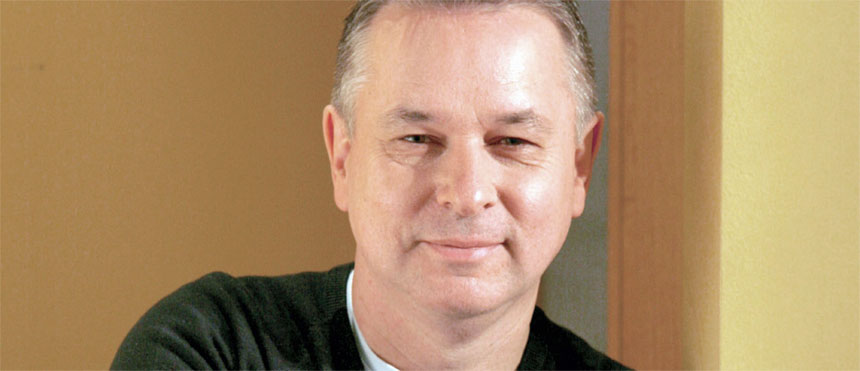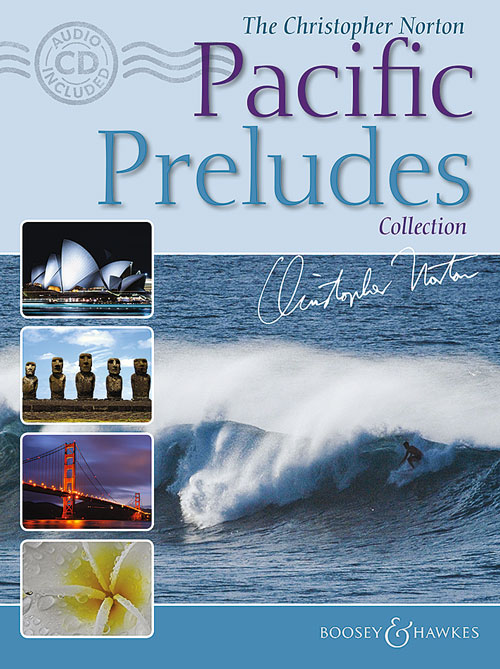Now is the Hour by Christopher Norton
Following the successful Eastern Preludes collection by the composer Christopher Norton, the Pacific Preludes are now set to be released on April 4. Piano Street’s Patrick Jovell talked to Christopher Norton, who gives us an exclusive glimpse into his compositional world. He is also generously offering Piano Street Gold members the score to Prelude no. 7 “Now is the Hour” as well as an instructive manual for how to practice the piece.
These collections allow us to explore the rich musical landscape of the East as each Prelude weaves together native themes from countries in this specific part of the world. The creator of the Micro Jazz series demonstrates an interesting fusion of Eastern and Western culture and styles and suits ideally intermediate to advanced-level pianists. The fourteen pieces are perfect for the concert platform, as well as providing excellent teaching material. An accompanying CD puts each Prelude on the map with a fine demonstration performances by British pianist Iain Farrington.
EXCLUSIVE DOWNLOADS:
Piano score: Now is the Hour by Christopher Norton
Practice manual: Now is the Hour by Christopher Norton
With kind permission by Boosey & Hawkes and Christopher Norton
– Christopher, we all know you as the creator of the Microjazz series which is one of the most widely used educational series ever published but your production as a composer is vast and diverse. Which was your idea and inspiration when you started creating Preludes collections for piano?
– I wrote the original Microjazz books back in 1981 – the brief I was given was “graded pieces in popular styles” In difficulty terms, none of the pieces in the original series were easier than Grade 1 or harder than Grade 5. This is one of the reasons the series became popular so quickly, the other reason being that there was a range of styles that students found very appealing. I was originally quite a “serious” pianist, playing repertoire that included the Barber Sonata, the Prokofiev 1st concerto and lots of classical repertoire. So it came quite naturally to me to write more challenging piano music and a request to write longer, more complex pieces in rock and Latin styles was, as they say, pushing an open door. The Rock Preludes and Latin Preludes, both written in the late 80s/early 90s, are still popular with students looking for more challenging fare that is also in a contemporary popular style.

– In 2015 the collection Eastern Preludes was published and contains pieces which weaves together native themes from countries including China, India, Japan, Korea, and Thailand with characteristically innovative popular music styles. For many a performer and teacher these materials can work as performance pieces or as an excellent introduction to works by the Impressionists. I know Debussy is your favorite composer but how do you think as a composer when combining modern modes with a basically impressionistic soundscape?
– I love Debussy because he liked to set up an atmosphere using complex textures with often quite simple melodic material. Taking existing tunes and weaving a tapestry of sound around them is something I particularly like to do. There are a number of pieces in Pacific Preludes where a melody is passed between the hands while other figuration happens above or below. The tunes I found are in a variety of modes, so there is an interesting harmonic palette in the Pacific Preludes, with very jazzy passages, passages that are pure texture and highly rhythmic and exciting pieces as well.
– Talking about the “serious” Christopher Norton, I just heard performances with Yuja Wang in Bartóks 3rd concerto and Peter Jablonski in the Stravinsky concerto and these composers’ battle between modernity and tradition. How would you distinguish art music in this context and how does this reflect your own composition work?
– I have spent most of my working life involved with educational music, in which modernity plays a less significant role than in some other fields! However, I have discovered that if I let my ear be the guide I can get away with delving into slightly more esoteric realms, including bi-tonality, aleatoric elements and free improvisation. I have recently written a Piano Sonata and it has a lot of time signature changes and quick contrasting of highly varied stylistic elements. Other large-scale pieces allow me to be slightly more experimental. At the moment I’m digitising the score of a Piano Concerto, written when I was 23, which includes elements of Bartok and Stravinsky.

– Now we are eagerly waiting for a new collection of Preludes, soon to be released and named Pacific Preludes. What can you tell us about these works?
– The Pacific Preludes use tunes culled from a variety of countries that border the Pacific. My starting point was my own origins – 2 tunes from New Zealand, Pokarekare Ana and Now is the Hour. I then added Waltzing Matilda from Australia and from then on it was a matter of finding appealing melodies from Central and South America, from the USA and Russia (topical!) and from China, Vietnam and the Philippines. There is a nice mixture of ballads, extrovert rhythmic pieces and rockers, as well as a ragtime piece (Waltzing Matilda) The pieces are challenging, but very pianistic.
– The Preludes in the Eastern collection as well as in the Pacific collection were recorded by British (and Hyperion artist) pianist Iain Farrington. Has this been a collaboration which has blended your composition process or raised interpretational or textual questions or considerations?
– Iain Farringdon is a fabulous pianist and musician and he played the pieces beautifully from the word go. I had one or two suggestions in terms of articulation and some slightly unusual pedal effects, but broadly speaking what you hear on the recordings of both Eastern Preludes and Pacific Preludes have been, as American politicians like to say, been approved by the composer.
The collection is now available from scott-music.com

Comments
Loved it — MUST learn it soon!
Lovely! Thank you for sharing. I learned that tune years ago with the words “Search Me, O God, and know my heart today….”
perfeto…..asi de simple
gracias por este regalo